What is a Content Creator? Description, Responsibilities, and Tips

These days, the term "content creator" is thrown around constantly. The people posting long-form YouTube videos are Content Creators. The people writing blog posts for businesses are Content Creators. The people pushing dozens of TikTok videos a week are Content Creators. Sometimes, it's even used as a derogatory term for artists who "sell out" and do business illustration, infographics, and the like.
All of this is true. Just about any form of written or visual media can be considered "content," and the people who make it are content creators. Today, though, I wanted to talk more about the professional side of things: the content creators who work for brands and businesses, making media.
What is a Content Creator?
A content creator is a person who creates content.
If that seems a little reductive, that's because it is. The role of the content creator isn't really a formalized position, and different content creators do different things. Even for this blog post you're reading right now, I technically have two or three different creators working on it, none of whom can do the jobs of the others, and all of whom are indispensable for the finished product.
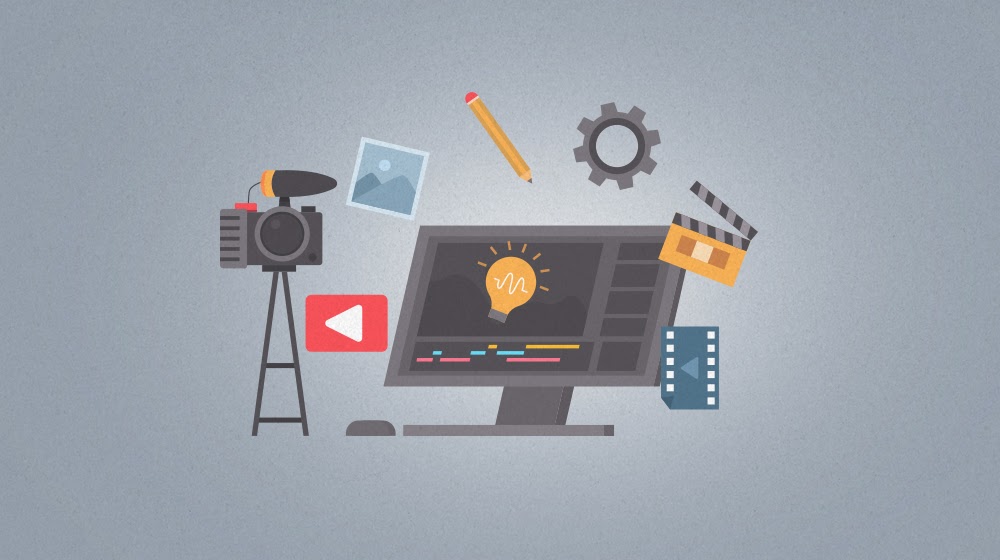
The job description, the responsibilities, the skills, and the experiences of each content creator – both the people and the positions – will vary. The content creators I hire are different from the ones you need to do the jobs that need doing. For example, I don't produce videos, but there are many skilled content creators who specialize in video editing, audio balancing, motion graphics, camerawork, and scriptwriting.
Web content writers, graphic designers, photographers, video content creators; they're all very different roles, but they all create content for the internet.
What is the Job Description of a Content Creator?
Since "content creator" isn't really a single role, there's no standardized job description.
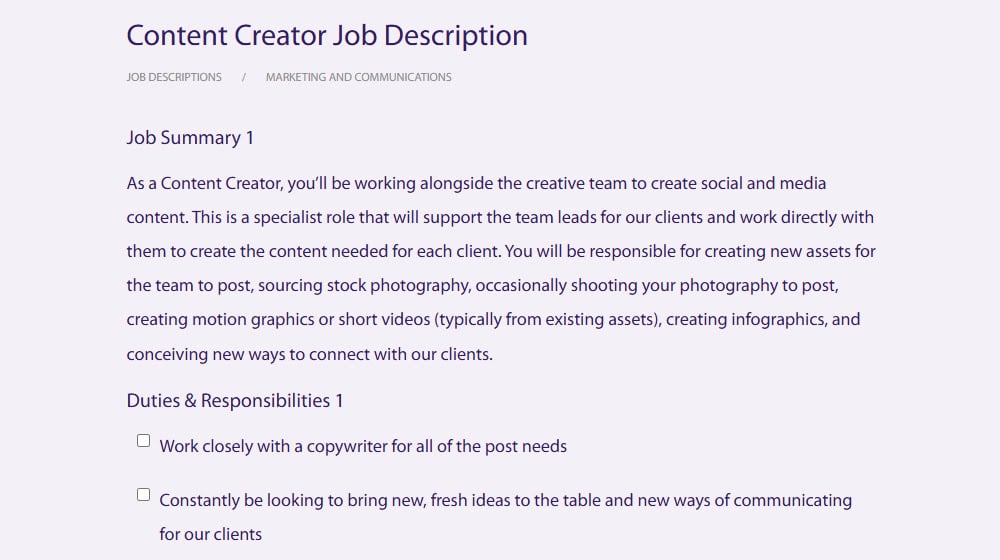
Here are a few examples from industry job aggregators:
- Content Creator Description from Workable
- Content Creator Description from Betterteam
- 10 Content Creator Descriptions from 100Hires
- Content Creator Description from Zippia
You'll notice that almost all of these job descriptions are more of a list of responsibilities than a formalized job description. That's because, again, the list of responsibilities is long and varied, and the definition of a content creator changes from organization to organization. They may be a writer, a photographer, a designer, a videographer, a composer, or something else entirely.
What Are the Responsibilities of a Content Creator?
When you look at the overall process of creating content, no matter what channel or platform it's for, there's a hierarchy of responsibility.
At the top, you have someone working as a content strategist. This person handles topic ideation and keyword research, SEO, competitive research, and all of the bird's eye management necessary for an overall content plan. The strategist builds up your brand, figures out where you fit in the industry, and finds ways to grow within and outside of that space.
Content strategists in blogging are often blog managers, managing editors, or "Chief Content Officer"-style directors. They're the high-level decision-makers, and they don't often create content themselves. Instead, they create plans and campaigns.
The step below this is the actual content creator, or a team of content creators. These are the people who take campaign plans, topic ideas, blog pitches, and content briefs, and turn them into the actual content that can be published for consumption. Whether it's ideas for blog posts or series', for podcasts, for infographics, videos, or something else entirely, this team does the legwork.
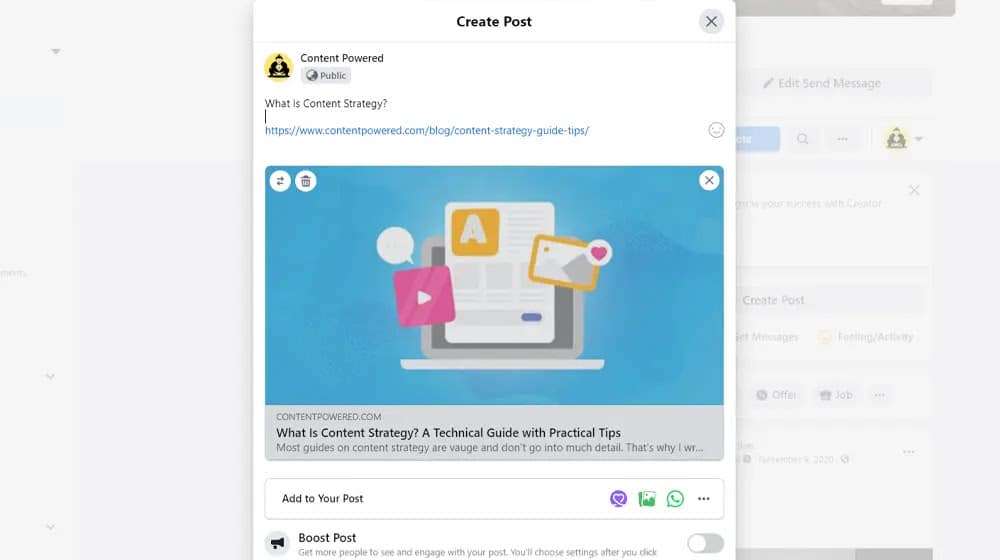
The specific duties and responsibilities of the content creator vary depending on what kind of content they're making but can include:
- Copywriting. The content creator might produce written copy for any of a thousand channels. This can include, but is not limited to, brochures, advertising copy, website copy, blog posts, social media posts, eBooks, skyscraper content, FAQs, product descriptions, and more.
- Research. The content creator is not necessarily an expert in their subject, or any given subject. They are, however, an expert in researching a subject to write accurately on it. This involves identifying reliable sources, digging deep into a topic, and aggregating information from various sources to develop a complete picture of a topic.
- Distribution and Promotion. Some, though not all, content creators will handle the distribution and promotion of the content they create. Small brands often lump these duties together, while larger companies might have a dedicated distribution manager for their content. This person handles posting to social media, advertising, and outreach.
- Pitching. In some organizations, the content creator is not managed by a blog manager or overall strategist; instead, they are tasked with coming up with their ideas themselves. In this case, the content creator pitches the topics they would like to cover, submitting a pitch to their editor or manager for approval before producing content.
- Graphic Design. "Content" on the web applies to more than just the written word. As such, a content creator may be responsible for photography, photo manipulation, or graphic design. However, in many larger teams, the role of graphic designer is handled by someone other than the primary content creator.
- Video Recording and Editing. Again, the content creator does not necessarily limit themselves to the written word. They may be tasked with writing scripts for video, as well as recording video, editing video, and producing finished video products. Like with graphic design, the content creator might not handle all of this themselves, and a stand-alone videographer or a team of video producers and actors may be involved.
- Audio Recording and Editing. Much like video, audio is a form of content that a content creator may produce. Writing a script, recording audio, editing audio, and producing a finished audio file – be it a radio commercial, podcast, or something else – can all fall under the purview of the content creator.
- CMS Management and Publishing. Oftentimes, a content creator will be tasked with handling the content management system for their parent company. For example, the content creator might be required to interact with WordPress to publish their content properly, which requires familiarity with the platform.
- Editing and Proofreading. The content creator is responsible for polishing their content, but they may also be responsible for editing, proofing, and generally polishing the content other creators produce.
- SEO and Optimization. Taking a first draft and optimizing it with keywords, focusing it on a specific audience or search intent, or broadening it for wider appeal are all part of the pre-publication content creation process.
- Fact-Checking. While some organizations use professional fact-checkers, and others don't do fact-checking at all, a good content creator still pays attention to the validity of the information they're producing to ensure that the facts are represented clearly.
- Interviewing. Some content creators, in the pursuit of creating content, will need to formulate and host interviews in various formats. They may be email Q&A sessions, discussions via voice or video call, or even in-person interviews, which are recorded and produced into content.
- Transcription. If the content creator is not responsible for interviews themselves, they may be responsible for transcribing the content of videos or audio files to use for other purposes, ranging from video subtitles to the basis of a blog post.
- Analytics. Content creators must be able to understand how well their content performs, how to change it to perform better, and how to develop reports on that performance for the people who make decisions above them.
- Monetization. Sometimes, the content creator is also responsible for adding and managing monetization strategies for a piece of content. Often, this means figuring out where to insert ads, what segments can include a sponsored shout-out, or where affiliate links can be placed naturally.
- Updating. As time goes on, old content grows stale and needs to be refreshed. Content creators are often tasked with taking existing content and refreshing it for a new life.
All of these are responsibilities for a content creator, but there may be half a dozen or more individual roles in these responsibilities. Collaboration can be considered another responsibility in that sense. A mid-sized company with a content creation team might have distinct individuals or even teams to handle strategy, copywriting, video production, audio production, editing and publishing, fact-checking, and analytics. It all depends on the scope of what you're doing, what you want to do, and how much you can afford to hire a team.
What Are the Requirements to Be a Content Creator?
When you read through such an expansive list of duties, you might assume that being a content creator means fitting within strict requirements. Fortunately, that's not usually the case. Content creators are frequently flexible, able to work together on different elements of a finished product, or able to learn new skills and tools to pick up the slack. This is especially true when looking at content creators or teams for small businesses, where hiring more than one or two creators at a time is impossible.
What are the actual requirements necessary to be a content creator? As always, the specifics vary. A lot depends on the kind of content being created and at what level. A global corporation producing sanitized marketing copy for international ad campaigns is very different from a local business writing blog posts.

Here's an idea of what you might see:
- Experience. A content creator typically needs experience in creating a specific type of content. Entry-level experience might include academic training, a personal blog, or time spent freelancing. Higher-level positions might ask for experience in professional marketing copy or video creation.
- Portfolio. Most content creator positions will ask for a portfolio of samples of the content creator's work so they know what they're getting. Experience does not necessarily make a content creator good, and an inexperienced content creator might be very talented.
- SEO Knowledge. Since the largest market for professional content creation is marketing, familiarity with at least the basic and intermediate requirements of SEO is essential. This can be specialized as well since video and podcast SEO are different from standard web content SEO.
- Education. Though not always required, education is often a requirement for a content creator position. Associate or Bachelor's degrees are common, often in a creative/arts/English field such as journalism, creative writing, or digital communications. More recently, dedicated marketing degrees have started appearing as well.
- Communication Skills. A content creator is an indispensable team member, and as such, they are constantly working within their organization tying different teams and elements together. They need to be able to communicate with everyone on their team, as well as groups outside of their team, to ensure content is produced accurately and on time.
Other requirements can vary from company to company. Familiarity with WordPress is a common requirement but not necessary for companies that host their content on other platforms. The same goes for publishing on platforms like YouTube. If your company doesn't make video content, this isn't a requirement, but if you're a video content creator, you'll need to know how the YouTube publisher dashboard and video SEO work. At higher levels, you might also see requirements such as familiarity with high-end platforms like HubSpot, tools like Semrush, and so on.
What Are the Benefits of Hiring a Content Creator?
If you've read the responsibilities of a content creator, you already know what the value of having one on your team can be.
Under the guidance of a strategist, the content creator is largely responsible for a huge part of the brand's messaging. Everything conveyed through blog posts, social media, email newsletters, branded content, and website copy is all under the purview of the content creator or team.
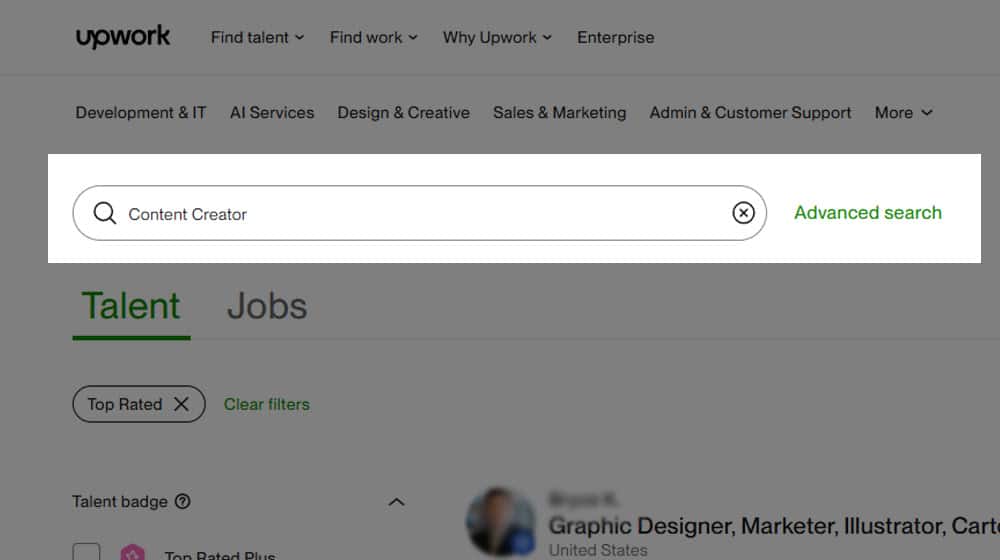
Of course, the strategist, editor in chief, or other top-level employee for the company will have an overview of all of this messaging. A content creator can't go wildly off the rails and distort the brand. They need to be guided to stay within the bounds of what the company wants their image to portray. However, a lot of subtle details are controlled by the content creator. Even little things like voice, tone, and style end up carrying the creator's personal influences.
Additionally, from a purely practical standpoint, a content creator handles a huge array of work that would otherwise be contracted out. By hiring a content creator or two, you reduce your reliance on freelance writers, video producers, and other third-party content agencies.
Should I Invest in a Content Creator?
It is my opinion that every company needs to have, at minimum, a website and a blog if they want to succeed in the modern digital world. While video, audio, infographics, and other forms of media are "optional but recommended", a blog is essential.

Unless you want to dedicate yourself to producing content, hire a content production agency, or hire freelancers and manage them yourself, you'll want a content creator to do it for you.
Moreover, a dedicated content creator you hire will be a lot more consistent than an anonymous team or a rotating cast of freelancers, which helps build up your site's voice and your brand's tone.
What Does a Content Creator Earn?
Payment is a big concern for many content creators. In fact, compensation can vary wildly. Low-level, entry-level, and freelance content creators may be struggling to get by working minimum wage, earning below $20k per year. Mid-level content creators, including those employed full-time with a company, tend to make $58k on average according to Glassdoor. Upper-level content creators can make as much as $80-$90k per year as well.
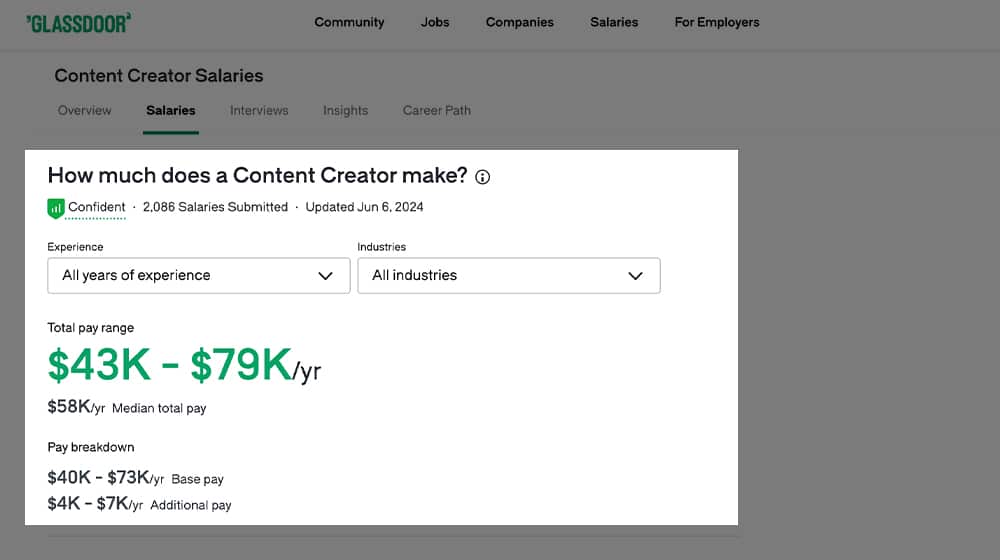
Freelance content creators have even been known to make significantly more but might also make significantly less. A lot depends on factors such as:
- What kind of content the creator is producing. Simple blog posts and web copy is cheaper than advanced marketing copy, which is cheaper than videos and audio. Graphics are their own deal.
- How often the content creator produces content. Often, especially with freelancers, content creators are paid on a per-project basis.
- Their hire type. Freelancers might earn more than employees, but employees get benefits. Contracted companies handle compensation for their roster themselves.
Again, it all varies.
A recent wrench thrown into this is AI. Generative AI has devoured the lowest levels of content creation, especially static images and written content. This has undercut the market, but also increased demand for high-end creators, who deserve and demand higher salaries. In fact, the Glassdoor average above has risen by $10k since I originally published this post.
It remains to be seen how this will fully shake out, with the tug of war between generative AI, AI disclosure rules, anti-AI sentiment, copyright lawsuits, and Google algorithm identification and downranking.
Do You Have a Question?
If you have any questions about content creators that I haven't covered here, feel free to leave them in the comments below.

This is meant to be a robust, evergreen guide to the content creator field, so I need your help keeping it going. Just tell me what you need!



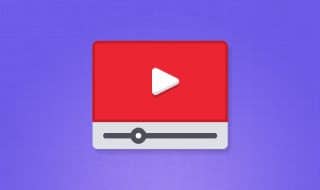



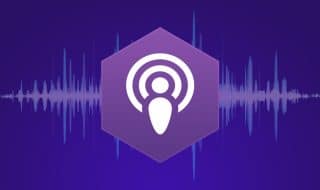


Comments